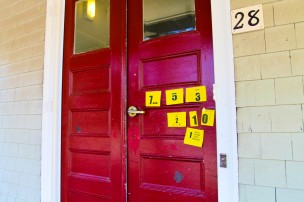
The Office of Sustainability recently announced that The Bayit and 86 Lawn A and B are the winners of its Do It In the Dark contest for the fall semester.
Do It In the Dark is an energy conservation competition hosted by the Office of Sustainability, the Office of Residential Life, and Physical Plant. All program houses and woodframe houses are automatically entered. At the end of each competition period, each house’s energy usage is compared with its average usage over the last three years; the houses with the greatest decrease from the average are declared the winners.
Though in the past the competition has run throughout the year and featured monthly winners, this particular competition spanned both the months of October and November 2013.
Sustainability Coordinator Jennifer Kleindienst explained the rationale behind changing the format of the contest last semester. One of the primary reasons is oil delivery to woodframe houses, which has skewed the data in previous years.
“One of the challenges with doing the monthly contest is that it was going on too long, and people were kind of losing interest because it was the same thing every month, month after month,” Kleindienst said. “We thought that we would try to change the contest to make it a little bit more fair and a little bit more accurate by combining October and November, because pretty much every house would receive an oil delivery in either October or November. So if we’re looking at the two months together, you don’t win Do It In the Dark because you were lucky enough to not get an oil delivery.”
Sustainability intern Ari Lewenstein ’16 asserted his belief that Do It In the Dark is an effective program and an important aspect of Wes to Wes, a new program that gives all residential energy savings to financial aid.
“We saved thousands of dollars…and you can’t discount Do It In the Dark’s role in that,” Lewenstein said. “Obviously there are lots of great environmental programs on campus that do their own thing, but I think Do It In the Dark for program houses and woodframes is a crucial thing. Everyone loves a good competition, right? It’s got a fun prize: a $150 prize for [the] wood-frame house winner and a $100 prize for [the] program house winner.”
Bayit House Manager Talia Baurer ’15 is excited to spend her prize money on a treat for her house.
“We’re missing some kitchen things, so maybe we’ll spend it on that,” Baurer said. “Maybe we’ll have a nice, big program, which would be awesome. Maybe we’ll take the house out to dinner. I haven’t really thought about it, but one hundred dollars is super fun!”
Baurer also said that she thinks competitions like Do It In the Dark can be a good way to remind students to practice sustainable habits.
“I think it’s very important to be sustainable,” Baurer said. “It’s an important thing for me because it’s how I was raised so I’m very conscious of it, though it’s not a huge priority for what I talk about with my residents just because there is so much to talk about. I try to remind them when I walk into the bathroom and the fan and the light are on, but it’s hard to send a million emails a week…. The Office of Sustainability does good work and tries to keep us more aware.”
Kleindienst echoed Baurer’s sentiment, suggesting that contests are successful in motivating students to be more aware of their energy usage.
“I think a lot of Wesleyan students are interested in sustainability and have energy conservation as something they know they should be concerned about, but contests are really useful because they just give that little extra push,” Kleindienst said. “You might care, but if [someone] is saying, ‘Hey, you could actually win a $150 dinner for your house if you turn off your heat’ it provides that little extra boost of motivation. It’s also just fun to see the actual results of what you do.”
The Office of Sustainability is currently hosting Do It In the Dark February, a single-month contest focused on tangible sustainability in everyday life.
“We’re calling it ‘28 days, 28 ways to save,’” Lewenstein said. “We have these calendars that are going out that have a different tip to save every day. On Friday, when the Olympics started, it was, ‘Turn down the heat in solidarity with those chilly Olympic athletes,’ or on a Sunday morning it’ll be, ‘Recycle all those cans from last night’ or something like that. We made a real effort to make it relatable to people’s everyday lives.”
Kleindienst suggested that the best way to save energy is to use less heating and turn off unnecessary electronics and lighting, but stressed that these are not the only effective methods.
“Doing more things with friends [is also encouraged],” Kleindienst said. “If you have a show that you like to watch, instead of everybody watching it in their own rooms, everybody can go to somebody’s house and 10 people can sit down and watch the same show. Then you’re only using one TV, you’re having more fun, and you’re not using as much energy.”
Lewenstein believes that Do It In the Dark and similar programs are an essential part of creating a sustainable University.
“Wesleyan has always been a progressive school, but in terms of focusing on sustainability, we’re coming into an era of Wesleyan that’s becoming focused on taking the next step to make ourselves one of the leaders in sustainability in the country,” Lewenstein said.


Leave a Reply